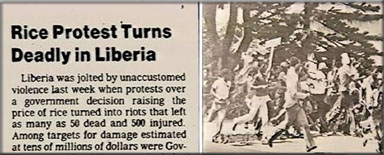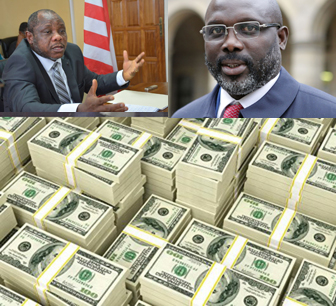
The Right To Protest And Lessons Learned From April 14, 1979
By: TQ Harris
The Perspective
Atlanta, Georgia
May 10, 2019
We are at a point in time relative to our nation's history that - in all terms and appearances - mimics the gradual build-up of tensions which culminated in the disastrous loss of lives and properties on April 14, 1979. Most Liberians alive today witnessed the violence firsthand. Those who were not yet born might have read about the horrific events that occurred on that fateful day or have become acquainted with the subject through word-of-mouth.
 |
|---|
| April 14, 1979 - Monrovia, Liberia |
Knowing this, Liberians cannot afford a repeat of April 14, 1979, mass protest and the devastation that ensued. We must, therefore, act quickly, come together and cobble workable policy prescriptions to avert a potential disaster which neither the government nor the people of Liberia can outrightly dismiss.
THE PROBLEM
The widely talked about the protest which is scheduled to take place on June 7, 2019, is, from all indications, rapidly gaining momentum throughout the length and breadth of Liberia. It is dividing Liberians along political, sectoral, ethnic and religious lines. The alleged missing $16 billion that galvanized the entire population, the controversial $25 million mop-up exercises, coupled with sky-rocketing exchange rate; and, the extremely high cost of basic commodities have made the idea of a mass protest an attractive remedy for all the ills facing the country.
This, however, could all be offset in a relatively short period of time if recommendations proffered herein are adopted and acted upon in a timely manner.
TAKING CHARGE OF THE SITUATION
To effectuate the proposed recommendations and other policy prescriptions will require the President himself taking charge and issuing orders necessary to implement these forward-looking ideas.
As President and Commander-in-Chief, Mr. Weah during this critical moment must be resolute and direct with his chief lieutenants - line ministers, deputies and others to ensure that all instructions and directives are executed accordingly.
Amid the ensuing national crisis, the President must be a hands-on leader without any hesitation to micromanage the day to day activities required of his administration. If this is not done and something unfortunate were to happen that negatively impacts the country, it is he, - the president – who will bear the greatest responsibility.
SUGGESTIONS FOR RESOLVING CURRENT PRESSING ISSUES
While the quick impact solutions put forth in this document are doable and workable, however, to be effective, government functionaries including the President must not lose sight of the fact that they are servants of the people, and as such, doing the people's business must be the highest priority.
The President must without delay make several major pronouncements, backed by Executive Orders because there is not enough time to enact legislations that will address these critical issues and positively impact the lives of the Liberian people. Each Executive Order must be read by the President himself, and he must explain exactly how it will benefit the citizens.
President Weah also must deliver on this National Unification Day, May 14, 2019, a major speech that points the nation in the direction of true, genuine unification. Because a house divided against itself cannot stand. And since there is no guarantee that the June 7th protest will be violence-free, we recommend the following as measures that could defuse rising tensions:
 |
|---|
1. The President must cancel with immediate effect the controversial CTN-Cargo Tracking Number regime. Container tracking in the past has worked just fine without this regime, which has been blamed for placing an additional cost on imported goods. And the Weah government must become more business-friendly.
2. Mandate a 25 kg bag of rice must be sold for no more than 1,625 LD as it was in December 2017. Minimum price markups for transportation to rural areas are allowed. Companies affected by the price reduction could receive tax waivers. Also, designate a government-approved, standardized rice measuring cup to be used by retail rice sellers throughout the country. Violators must be penalized.
3. Call on all merchants to reduce the price of commodities and stop hoarding, especially as regards the U.S. dollar-priced items since inflation is mostly driven by the depreciation of the Liberian dollar.
4. Mandate the Liberian dollar exchange rate, which is now above LD$175, must with immediate effect return to 125 LD as it was in December 2017. Vigorous enforcement of this mandate must be carried out by the Central Bank of Liberia as well as Law Enforcement agencies.
5. A mandate by Executive Order that all cash transfers into Liberia through companies such as Western Union, Money Gram, etc. must be paid in Liberian dollars, as a means of increasing the Central Bank's U.S. Dollars reserves.
6. A mandate by Executive Order that all Bank transfers into the country must be paid to recipients in Liberian dollars. For the duration of this mandate, the Central Bank shall be the sole dispenser of U.S. dollars; however, for convenience, the CBL shall designate select Commercial Banks that will also dispense U.S. dollars to the public under tight monetary controls. And the Central Bank must respond expeditiously to requests for U.S. dollars and improve its overall efficiency.
As the Central Bank moves towards reshaping monetary policies and stabilizing the exchange rate, it must also consider changing the Liberian currency and printing new bills. And, as soon as possible, all bills currently in circulation must be removed from the market.
7. A mandate by Executive Order that all licensed Foreign Exchange Bureaus and all other money changers must no longer dispense U.S. dollars to the public. Penalty for violating this mandate must be severe.
8. A mandate by Executive Order that effective immediately natural-born Liberians will no longer be required to have a visa to enter Liberia. It is well documented that Liberians in the Diaspora contribute tremendously to the Liberian economy, infusing millions of dollars yearly in hard currency. These remittances ease the pressure on the government to provide essential services for the population. The government must recognize this critical asset.
9. Announce the Government Mass Agriculture Initiative (GMAI) program, which is designed to convert thousands of hectares of land along the Monrovia-Buchannan Highway, Monrovia-Ganta Highway, and the Brewerville-Bomi Highway, etc. into major agriculture corridors for food production on a commercial scale. The lands will be cleared, de-stumped and made ready for farming. The first of these projects must begin within four to six months.
GMAI essentially are quick impact agriculture projects that involve planting of crops with relatively short gestation periods such as Corn, Cassava, Okra, Pepper, Bitter-balls, etc., and it is also intended to create jobs for the Youths, as well as skilled and unskilled persons, and make Liberia self-sufficient in for production.
Note: There is a comprehensive package for producing food in Liberia on a commercial scale that is available for the President review and consideration if he so desires. This plan was prepared by Liberians who believe agriculture is critical in lifting Liberians out of poverty.
10. Announce a new government proactive initiative that will address the high crime rate across the country, particularly within greater Monrovia.
11. Announce a plan to clean up the City of Monrovia and its environs. As a short-term measure, the Monrovia City Corporation (MCC) could station its workers at various garbage deposit sites and supply them with large specially marked, heavy-duty plastic garbage bags. Garbage brought to the site will be placed into these large garbage bags for transport to the general dumpsite.
12. The President must declare with immediate effect a one-year moratorium on the increase of school fees across the country. In light of the dire economic situation Liberians are currently undergoing, it would be a highly appreciative gesture.
13. The President must with immediate effect roll back Executive Order 84 that reduced Liberia Exclusion Zone. And the Weah Administration must put forth a plan that protects the local fishing industry.
14. The President must make a passionate appeal to both the Legislative and Judicial Branches, calling for their support in restoring Liberians' confidence in the government.
15. It’s high time the President assess the performance of heads of the various Ministries and Agencies of government and consider repositioning some of his appointees for maximum productivity. He might find it necessary to recruit more competent individuals to replace a number of individuals who have consistently underperformed.
CONCLUSION
There is much that the government has to do in order to address the myriad problems facing Liberia, which has given rise to widespread discontent and calls for mass protests. If the recommendations put forth in this document are implemented in a timely manner, this will, in the short term, reduce downward pressure on the economy and address liquidity issues.
As the planned June 7th protest approaches, the President must become the government’s chief communicator, constantly calling upon the citizens to remain calm and act in accordance with basic principles of law and order. He must acknowledge the citizens' right to protest peacefully, accept responsibility for the problems and take concrete steps to correct them. The focus now must be on keeping Liberia safe, peaceful and protecting lives and properties.
About the Author: TQ Harris can be reached at: Phone: +231 88 040-2479 / Email: tqharrisgroup@yahoo.com